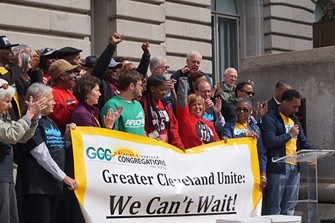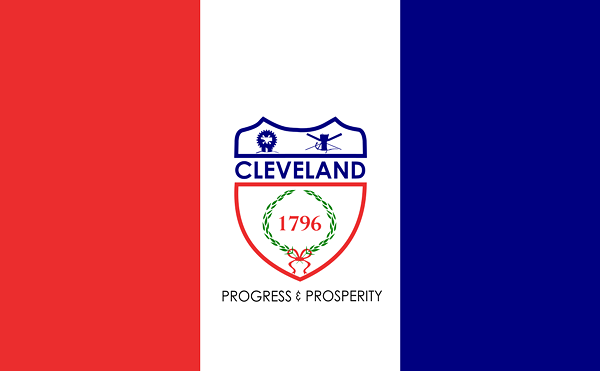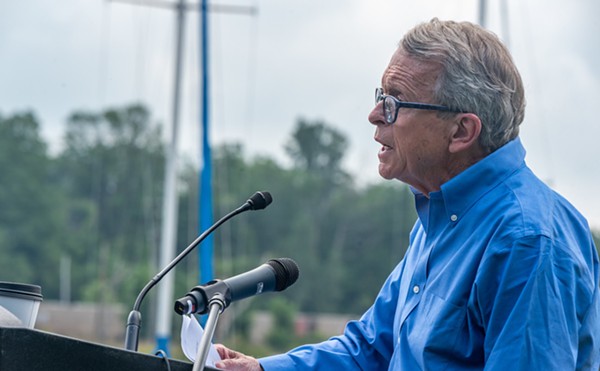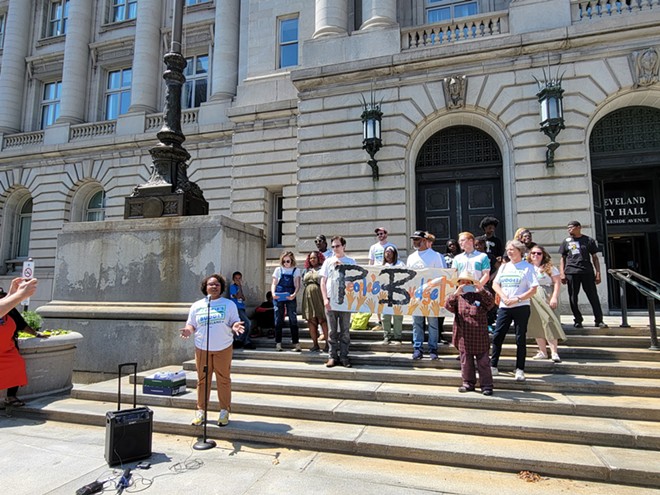
Throughout his column published June 2 on Cleveland.com, and in untold social media sorties since, he has maligned and mischaracterized the local People’s Budget Cleveland (PB Cle) initiative while advancing a warped and self-serving vision of democracy.
It’s hard not to be so blunt when his arguments fluoresce with wrongheadedness at every turn. These arguments are made in bad faith, naturally — that’s standard operating procedure in Cleveland — but they merit refutation regardless.
Why? Because an astonishing number of local leaders and organizations are on Harsh’s side. His colleagues on city council are content to let him play mascot, but behind the scenes, they’re working the phones harder than at any point since the Q Deal, calling in favors and threats to assemble an army of pastors and plumbers and police officers who will publicly oppose PB. This army has now drafted into its ranks not only the familiar, atrophied old boys clubs, but the region’s more progressive labor unions and council’s brightest light.
Furthermore, Harsh’s “DEBATE-ME!” histrionics have materialized an actual debate, scheduled for Sept. 26. Under no circumstances should Clevelanders let this bozo batter them into submission Bill O’Reilly-wise.
To refresh: Participatory Budgeting is a straightforward application of democracy, the idea that people should have a say in how they are governed. In existing PB pilots in the U.S. and around the world, residents collectively decide how a portion of their local budget is spent. This portion is typically very small.
In Cleveland, a grassroots coalition gathered signatures to place a city charter amendment on the November ballot. Their proposal calls for 2% of the city’s budget to be dedicated to projects selected by residents. (That’s about $14 million per year, once PB is fully operational in 2027.)
PB Cle is taking the measure to voters only because city council rejected a smaller-scale pilot, backed by Mayor Justin Bibb, earlier this year. It was one of the more extraordinary displays of City Hall hypocrisy in recent memory. On the day it happened, council had proposed a substantial increase in their cut of casino revenue dollars to fund projects in their wards. Representatives from the Bibb administration warned against the idea, but council members protested that their neighborhoods were desperate for resources. When PB Cle appeared a couple hours later, proposing a different way to fund the same sorts of neighborhood projects — only this time with direct citizen input — the council’s tune changed to one of horror and reproach.
It’s worth reflecting that Bibb and the council have now allocated more than half a billion federal dollars via ARPA, including millions for lakefront development, lead abatement, site readiness for business attraction, downtown lighting displays, individual nonprofits, and so on. Council even allocated $10 million to the West Side Market after hemming and hawing about it for weeks. The only proposal they nixed outright at the committee table was participatory budgeting.
So what’s going on here? What about this initiative is so pernicious?
The body’s president, Blaine Griffin, gave us a clue when he opened his City Club of Cleveland remarks in January with a rebuke of PB Cle, calling it a “subtle effort to dismantle leadership structures” in Cleveland, led by organizers using democracy as a ruse.
Harsh took that critique a step further in his June column, portraying the initiative as little more than a get-rich-quick scheme devised by organizers.
“To date, the only idea they’ve generated is to secure funding for themselves,” he wrote. “The entire process is set up for corruption on a scale that would make Larry Householder blush.”
That conspiratorial line was debunked by PB Cle’s Jonathan Welle, who noted in a Jun. 9 response that 96% of the $14 million allocated to PB would go to implementing projects. Administrative costs would come to roughly $500,000 per year, including funding for two staffers, small annual stipends for 11 residents serving on a steering committee, community education and election costs.
“For the record,” Welle wrote, “my organization, PB Cle, receives zero dollars and has no role in directing spending.”
But Harsh and the council don’t care. They don’t care that PB is expressly designed to increase civic participation. They don’t care that it’s optimized for cities with chronically low voter turnout like Cleveland, where only 16% of residents voted in the last municipal election, and only 20% voted in the Aug. 8 special election that obliterated Issue 1. They don’t care that PB Cle has elevated the voices of youth and marginalized communities and has incorporated best practices from pilots across the country.
These facts are irrelevant. Council will continue to frame PB Cle as an anti-democratic scourge.
To understand why, we must recall that, with limited exceptions, council members don’t know what democracy means. They don’t recognize it as a fundamental principle, like freedom or peace, but rather as a discrete set of pageants and protocols that happen in November.
Absolutely central to their interpretation is that they are the result of the democratic process; and that once elected, they are its total embodiment. Supporting democracy, therefore, means supporting Cleveland City Council. Going against the council, or doing anything they don’t like, must be anti-democratic.
That’s all there is to it.
It looks extremely stupid spelled out like this, but it’s no exaggeration. Council members say versions of the above without a trace of self-consciousness all the time. We are the elected ones, so democracy is up to us, etc.
Blaine Griffin offered the clearest distillation of their cast of mind in a 2019 floor speech.
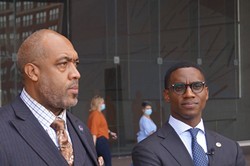
"We've got to set a tone that nobody should ever mess with this body,” he said. “These folks need us because we were duly elected and we put ourselves out there to work hard on behalf of the citizens, not them... The body of this council needs to be shown respect whenever we go anywhere. We need to send a strong message that when you mess with us, you will be dealt with."
That authoritarian perspective has informed the rhetoric of council’s allies on the PB issue, who now affirm that residents get their one and only chance at democracy on election day each year, (and should butt out afterwards, is the unspoken coda.)
“Elections provide an opportunity to citizens to vote for the people they believe will best represent them in all actions impacting Cleveland city affairs,” said Broadview Heights resident and famous champion of democracy Dave Wondolowski, in a press release opposing PB Cle on behalf of the Building and Construction Trades.
“That includes deciding what projects the city will pay for. Cleveland residents expect their elected officials to do extensive research on the best and highest use of taxpayer dollars, and to make decisions for the better of all residents. If that doesn’t happen, residents will let officials know, especially during the next election.”
Does Wondolowski believe this fairy-tale? Because no one else does.
Setting aside the most fanciful notion of all — council members doing “extensive research” — the implied idea that residents have the ability to affect policy by voting out individual representatives is absurd. Wondolowski, city council, Justin Bibb and any other Democrat serving up this baloney in Cleveland would surely lament how, at the Ohio Statehouse, a Republican supermajority fortified by partisan gerrymandering has all but eliminated the power of the ballot box in counties like Cuyahoga.
Imagine being told, on the heels of HB6, waves of anti-trans legislation and attempts to fatally weaken public education, that the solution to corruption in Columbus was to vote harder for Terrence Upchurch and Nickie Antonio.
At the local level, the mechanisms are different, but the effect is of a piece. Cleveland City Council uses its power to appoint successors and the ample financial resources of the Council Leadership Fund to shape the body far more actively than voters do, to say nothing of the 80-odd percent of eligible residents who don’t vote in primaries and municipal-only elections.
And though they view themselves in heroic opposition to the Republicans of the Ohio Statehouse, the Democrats of Cleveland City Council have long used the same playbook to subvert democracy.
Council’s resumé under former president Kevin Kelley should still be fresh in voters’ minds: They disqualified the CLASH ballot initiative on a legal technicality, rejected more than 20,000 signatures for the Q Deal referendum (and then sued themselves to stall while leaders hatched a backroom deal with pastors), and even allied with Republicans in Columbus to pass preemptive legislation preventing a local minimum wage increase, all to quash citizen-led movements.
City lawmakers may comfort themselves that their politics are less grotesque, but they are every bit as power-mad, vindictive and anti-democratic as their counterparts in the General Assembly.
All that being said, PB Cle opponents like Kris Harsh can’t very well come out and admit that they’re huge freaking babies who don’t want to share their toys. So they resort to tried-and-true tactics: disparaging organizers as corrupt and meddlesome outsiders; peddling doomsday hypotheticals without a shred of supporting evidence; and belittling the effort as a distraction in the face of more pressing concerns.
Once you hack away the fear-mongering, though, Harsh’s opposition boils down to two key points: Participatory budgeting, he argues, is ineffective and expensive.
In the service of his thesis, Harsh cites but a single source, a study conducted by the Brennan Center for Justice. He notes correctly that four of the eight U.S. and Canadian cities profiled in that study have ended their PB pilots.
But he ascribes an erroneous cause: “PB is so poor as a civic engagement tool,” he asserts, that it failed in half of the cities the Brennan Center observed.
That’s simply not the case. For starters, the study was undertaken to document “why PB thrives in some cities and fails in others.” Researchers didn’t randomly select PB pilots and discover that half of them crashed and burned; they investigated cities with a range of outcomes on purpose, to paint a more complete and rigorous picture.
If Harsh had bothered to read the study, incidentally, he might have been interested to learn that its key findings are at odds with his position.
“Americans are hungry for a louder voice,” it concludes. “And their satisfaction with government is closely connected to their ability to participate effectively in the democratic process and impact political and governmental decision-making.”
Where PB pilots failed, the Brennan Center found, they did so for three identifiable reasons:
- Failing to fully empower residents by keeping too much control in the hands of city government.
- Not providing enough project funding to generate excitement among residents.
- Not providing funding to hire dedicated staff, thus requiring government staff to run PB on top of existing job responsibilities.
If Harsh were sincerely concerned about PB’s effectiveness, in that case, he should appreciate that local organizers did their homework. After all, they wrote provisions in the charter amendment to address all of the above: by ensuring that city council does not have veto power over resident decisions; by seeking substantial annual funding; and by creating staff positions to ensure PB’s smooth operation.
But Harsh is not actually concerned about PB’s effectiveness, no more than he’s concerned about the targets of its programming. In his June column, for example, he rehearsed a dangerous argument that he has since workshopped into a slogan.
PB could become “a vehicle for gentrification,” he foretold, because in other cities where PB has been tried, only residents with the most social capital participated.
Again, this is precisely the opposite of the reality on the ground. And the reason why it’s dangerous (for his own tenuous position) is that in a low-turnout city like Cleveland, traditional voting — the beginning and end of democracy, according to city council — is much guiltier of reflecting these quote-unquote “gentrified” interests.
“Whereas electoral politics typically engages the ‘usual suspects’—higher-income, older constituents—PB engages traditionally marginalized constituents, including youth, formerly incarcerated constituents, and undocumented immigrants,” read a 2022 analysis of PB in the Boston Review.
And contra Harsh’s critique that PB doesn’t actually increase civic participation, research on New York’s PB process found that participants were 16 percent more likely to vote in the next election than those who had not participated.
“The effects are even greater for those who have lower probabilities of voting,” the analysis found, “such as low-income and Black voters.”
In defiance of these published outcomes, which PB Cle has taken great pains to underscore in its communications with city council, Harsh has commenced a media tour trotting out his new slogan: the “Privileged People’s Budget.” No one should take it seriously.
Alas, Cleveland City Council will. They want to believe that PB is for privileged people because they want to believe that they are the good guys, the true guardians of democracy and equity. As such, they’ll continue to incorporate the language of progressive activism in their messaging, trying to convey that opposing PB Cle is right and just.
“#LaborUnited will never be defeated!” Harsh Tweeted after the North Shore AFL-CIO fell in line with the army of PB opponents earlier this month. “In November, stand in solidarity with 60,000 Clevelanders living in union households and vote NO on the Privileged People's Budget.”
Far more compelling than Harsh’s wild-eyed screeching about privilege is the seemingly even-handed opposition centered on the size of the PB Cle allocation. At 2% of the budget, Cleveland’s PB process would become the largest in the country. That has folks on pins and needles.
Disregard the union households from the Building and Construction Trades, by the way. They were never going to support PB. They benefit from a status quo where public dollars subsidize downtown real estate interests, and have stood arm in arm with elected leaders and establishment power players to support every regressive tax and stadium financing swindle in the city’s history. That’s not going to change anytime soon.
But other unions are opposing PB as well, and they are justifiably concerned (given the atmosphere) that their staffing levels and wages could be in jeopardy.
“If we can’t attract paramedics now, how are we going to be able to attract them if we tell them, ‘I’m sorry, we can’t give you any raises. We had to give them to an experiment in democracy?’” the secretary of Cleveland’s EMS union said in July.
This scarcity mindset was articulated most convincingly by the city’s finance chief, Ahmed Abonamah, in an interview this summer with Cleveland.com.
“We are in a position where our economic pie continues to shrink of resources, and we still have to provide the services that residents deserve and expect,” he said, echoing the line the administration gave to council when they begged for more casino funds.
This deference to fiscal responsibility has persuaded Jenny Spencer and Rebecca Maurer, two agenda-setting councilwomen who were among the PB pilot’s co-sponsors earlier this year.
“For three municipal budget cycles, I have been part of difficult decisions at the budget table,” Spencer wrote in her statement of opposition. “Cleveland’s General Fund budget primarily focuses on basic services and needs. The $14 million in the Charter Amendment dwarfs the entire annual budgets of many City departments, including the Department of Aging ($1.87 million), City Planning ($2.91 million), Animal Care & Control ($3.69 million), Community Development ($2.56 million) and Economic Development ($1.92 million).”
Principled, data-driven explanations like these are tailor-made for voters who regard themselves as enlightened, who support democracy-building efforts in principle but who fear that the annual allocation in the PB charter amendment is simply too large to warrant support.
They need not be troubled. This argument is misleading and dumb, especially in the local context.
In the first place, funding PB is not an example of what’s called a zero-sum game, in which the gains of one party necessitate the losses of another. Harsh and the alarmists disparage PB as an “activist tax” that will create a gigantic “hole” in the city’s finances, but that’s a gross mischaracterization. The $14 million allocated to PB will not be removed from the balance sheet, whisked away, never to be seen again. On the contrary, it will be used to fund the same sorts of things it funds now: parks, roads, payroll, community programs, “basic services,” etc. The one thing that changes is who decides where it goes.
This is a critical point, and it’s one that PB’s opponents occlude either because they don’t understand or because it makes the charter amendment seem much riskier. The entire department of public health will have to be scrapped! Hundreds of cops will lose their jobs! Nonsense. Beyond the administrative costs, PB is not a recipient of city money, it is a mechanism by which city money is disbursed.
And what PB supporters contend is that the public is just as capable of making “difficult decisions at the budget table” as city council is. And crucially, they are far less likely to be influenced by elite special interests while doing so.
Indeed, residents who are eager to see improved resources and infrastructure in their redlined neighborhoods are the last people on earth who would gamble away precious public dollars on ill-conceived projects that imperil city services.
Cleveland City Council already does that on its own.
We needn’t dig up ancient history to find an example. It was only last month that the Cleveland Cavaliers made headlines for requesting $24 million in urgent repairs at Rocket Mortgage FieldHouse — escalators, TV cables, things of that nature — that must be paid, per the team’s lease, by the public.
These costs are generally covered by the county sin tax on alcohol and cigarettes. But the Cavs, who were allotted roughly $92 million over the 20-year lifespan of the tax, have already blown through all but $10 million of the projected total proceeds.
That leaves a $14 million deficit that the city and county will have to produce. To date, no one has the foggiest idea where it will come from, (and no one has dared mention the millions of dollars in urgent repairs that will be requested from 2024 to 2034. Yikes!) Nevertheless, this budget crisis has passed largely without comment by city and county leaders, who must be confident in their ability to issue additional bonds, reassign future tax revenue streams, or simply plunder their respective general funds to make good on their contractual obligations.
Local elected leaders have been funneling hundreds of millions of public dollars to privately operated stadiums for decades. It just so happens that this time, the unfunded remainder of one routine Cavs request is the same annual value that the November charter amendment seeks for PB, so it presents a tidy side-by-side case study.
In the Cavs’ case, the $14 million actually may create a hole in the budget and will be used to fund escalators at a facility that generates massive profits for its billionaire operator. In the case of the PB charter amendment, the $14 million will fund an array of community projects and programs that residents across town nominate and discuss and vote on together.
Only in one of the above scenarios have elected leaders preached in anguished tones about shrinking pies and balanced budgets and the impairment of essential city services, while allies bear witness to council’s “extensive research” on “the best and highest use of taxpayer dollars.”
It should be perfectly obvious, given this dynamic, that when guys like Kris Harsh rave about the 2% allocated to PB being spent “outside the guardrails” of city council, many voters take it as an insult. What have these supposed guardrails done for us lately?
For them, if the charter amendment passes, the sliver of the budget set aside for PB will, at last, be spent inside the guardrails of a true democratic process, led by residents who believe that public dollars ought to be for the public.
It should be noted, finally, that there were last-minute attempts at compromise. Rebecca Maurer frantically tried to broker talks between PB Cle and council leadership with the goal of reducing the annual allocation to a more palatable $5 million. Those talks collapsed, in spite of what Maurer referred to as everyone’s good intentions.
When PB Cle issued a statement in the aftermath, using a line about “streets over stadiums,” Kris Harsh pounced on it in comments to the local media.
“If this is actually about stadium costs, then let's address that directly and together, he said. “There is no need to fight labor, City Council, the mayor and the people of Cleveland on this."
But there is a need to fight. Lest Harsh forget, the public very recently attempted to address stadium costs directly and together, when more than 20,000 of them signed their names to a petition seeking a referendum on the Q Deal. Council responded by rejecting those petitions and working backchannels to circumvent voters entirely and ensure the deal’s passage.
That’s just one example, but it’s illustrative. Many residents are fed up with being sidelined and sabotaged by their own elected leaders. Many others have been sidelined and sabotaged for so long that they’ve given up altogether, reduced to apathy and despair. It is those people — and in Cleveland, they are everywhere — whom PB seeks to welcome back into the fold.
“People know what they need and what they want, and if you give them the tools, they will make good decisions,” said a former Nashville city council member, when the Tennessee City expanded its PB program earlier this year.
If only Cleveland leaders thought so.
Ren Borba (he/him) is pursuing a graduate degree in the natural sciences in Cleveland after a brief career in corporate advertising on the West Coast. He lives with his partner and two dogs in Ward 11, but you’re more likely to find him reading or snoozing on a riverbank in the Cleveland Metroparks. He is not on social media, by the grace of God.
Subscribe to Cleveland Scene newsletters.
Follow us: Apple News | Google News | NewsBreak | Reddit | Instagram | Facebook | Twitter | Or sign up for our RSS Feed

